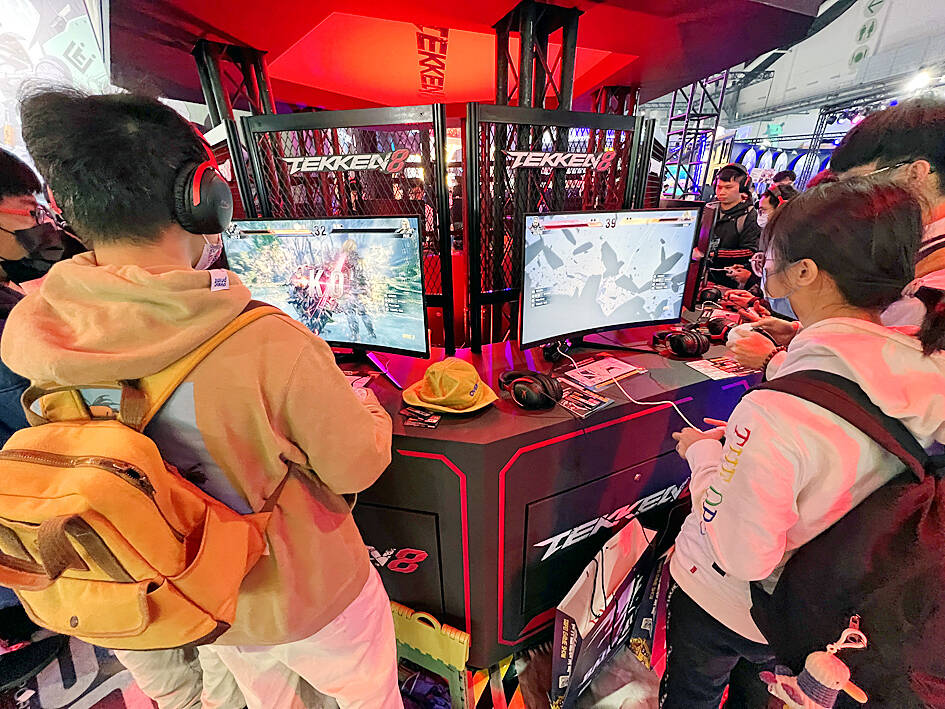A study by Taiwanese and Japanese researchers has found that video games translated into local languages can boost sales revenue in those markets by as much as 12.1 percent, the first research to offer concrete evidence of how translation supports international trade.
While translation is known to lower cultural barriers and make products more accessible to consumers, its economic impact has long been difficult to measure.
The study, led by Academia Sinica Institute of Economics researcher Yang Tsung-han (楊宗翰) and Yuta Watabe, a research fellow at the Tokyo-based Institute of Developing Economies, analyzed sales data from more than 10,000 video games in 2018 across more than 70 countries on Steam, which accounts for about 70 percent of global game sales.

Photo: CNA
They found that localized games earned at least 10 percent more revenue in markets where they were translated, highlighting the commercial value of product localization.
Yang said the team chose video games rather than books as their subject because books in different languages are considered separate products competing for the same audience.
In contrast, video games typically have a single version in which players can freely select their preferred language, providing a cleaner comparison of the translation’s effect on sales, he said.
Video game sales have surpassed film, music and sports in global sales, and can be instantly purchased across borders online, he added.
Game translations and subtitles also directly affect player experience, making the game easier to learn and understand, he said.
Games offering more language options are typically produced by larger companies, as translating into multiple languages requires significant financial resources, Yang said.
How much financial firepower a company has naturally determines its ability to use translation to bridge cultural and linguistic divides, he said.
However, the data were collected before the emergence of ChatGPT and other artificial intelligence (AI) translation tools, Yang said.
The team’s model suggests that AI applications such as real-time subtitle translation, although not yet fully accurate, are helping to further dismantle language and cultural barriers in global trade, he said.
This trend extends beyond cultural products to general consumer goods, with e-commerce platforms such as Amazon reporting sales growth linked to automatic translation, he added.
The team plans to examine the economic impact of AI-driven localization before and after such tools became widespread, Yang said.
The study, titled “The Tower of Babel: Localization, translation, and international trade,” was published in the European Economic Review.

MAKING WAVES: China’s maritime militia could become a nontraditional threat in war, clogging up shipping lanes to prevent US or Japanese intervention, a report said About 1,900 Chinese ships flying flags of convenience and fishing vessels that participated in China’s military exercises around Taiwan last month and in January last year have been listed for monitoring, Coast Guard Administration (CGA) Deputy Director-General Hsieh Ching-chin (謝慶欽) said yesterday. Following amendments to the Commercial Port Act (商港法) and the Law of Ships (船舶法) last month, the CGA can designate possible berthing areas or deny ports of call for vessels suspected of loitering around areas where undersea cables can be accessed, Oceans Affairs Council Minister Kuan Bi-ling (管碧玲) said. The list of suspected ships, originally 300, had risen to about

DAREDEVIL: Honnold said it had always been a dream of his to climb Taipei 101, while a Netflix producer said the skyscraper was ‘a real icon of this country’ US climber Alex Honnold yesterday took on Taiwan’s tallest building, becoming the first person to scale Taipei 101 without a rope, harness or safety net. Hundreds of spectators gathered at the base of the 101-story skyscraper to watch Honnold, 40, embark on his daredevil feat, which was also broadcast live on Netflix. Dressed in a red T-shirt and yellow custom-made climbing shoes, Honnold swiftly moved up the southeast face of the glass and steel building. At one point, he stepped onto a platform midway up to wave down at fans and onlookers who were taking photos. People watching from inside

Japan’s strategic alliance with the US would collapse if Tokyo were to turn away from a conflict in Taiwan, Japanese Prime Minister Sanae Takaichi said yesterday, but distanced herself from previous comments that suggested a possible military response in such an event. Takaichi expressed her latest views on a nationally broadcast TV program late on Monday, where an opposition party leader criticized her for igniting tensions with China with the earlier remarks. Ties between Japan and China have sunk to the worst level in years after Takaichi said in November that a hypothetical Chinese attack on Taiwan could bring about a Japanese

STREAMLINED: The dedicated funding would allow the US to transfer equipment to Taiwan when needed and order upgraded replacements for stockpiles, a source said The US House of Representatives on Thursday passed a defense appropriations bill totaling US$838.7 billion, of which US$1 billion is to be allocated to reinforcing security cooperation with Taiwan and US$150 million to replace defense articles provided to the nation. These are part of the Consolidated Appropriation Act, which the US House yesterday passed with 341 votes in favor and 88 against. The act must be passed by the US Senate before Friday next week to avoid another government shutdown. The US House Committee on Appropriations on Monday unveiled the act, saying that it allocates US$1 billion for the Taiwan Security Cooperation Initiative